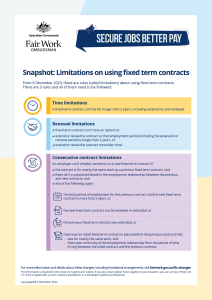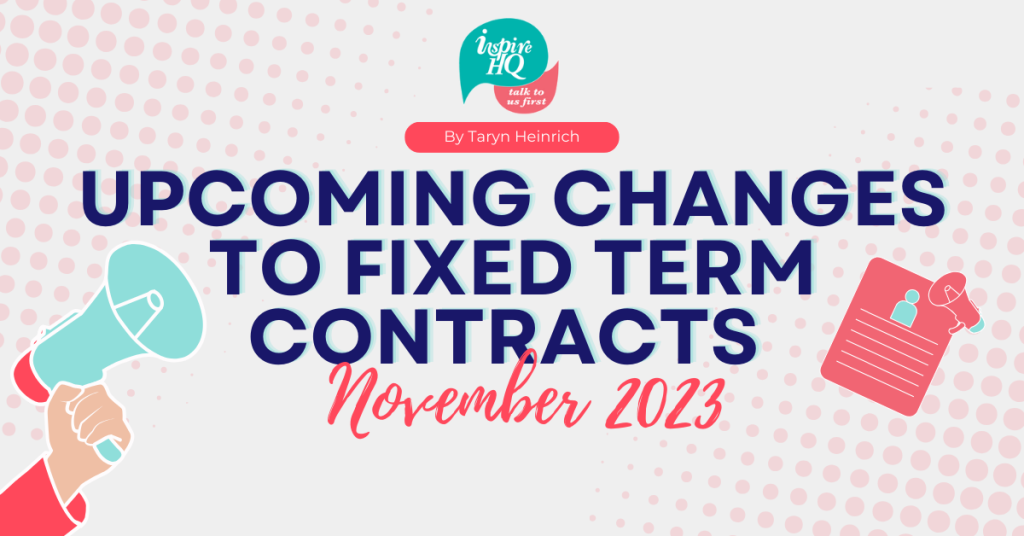Fixed term contracts are employment agreements that specify a predetermined duration for the employment relationship. Unlike permanent or open-ended contracts, fixed term contracts have a defined and start end date.
These contracts are often used for temporary or project-based work. Employers may hire individuals for a specific project, to cover a temporary increase in workload, or to replace an employee on leave.
Information from Fair Work Website
From 6th December 2023 there are rules (called limitations) about using fixed term contracts after this date. These limitations relate to:
- How long a fixed term contract can be (time limitation)
- Renewing a fixed term contract, including how many times a contract can be renewed (renewal limitations)
- Employing a person on consecutive contracts (consecutive contract limitations)
Employers must also give employees they are engaging on new fixed term contracts a Fixed Term Contract Information Statement (FTCIS) This information statement must be provided to employees before they start employment, or as soon as possible after. (The FTCIS will be available to download from the Fair Work website from 6 December)
Time limitation
A fixed term contract can’t be for longer than 2 years, including extensions and renewals
Renewal limitations
A fixed term contract can’t have an option to:
- Extend or renew the contract so that employment period (including the extension or renewal period) is longer than 2 years, or
- Extend or renew the contract more than once
Consecutive contract limitations
An employer can’t employ someone on a new fixed term contract if:
- The contract is for mainly the same work as a pervious fixed term contract
- There isn’t a substantial break in the employment relationship between the previous and new contracts, and
- Any of the following apply:
- The total period of employment for the previous contract and the new fixed term contract is more than 2 years, or
- The new fixed term contract can be renewed or extended, or
- The previous fixed term contract was extended, or
- There was an initial fixed term contract in place (before the previous contract) that:
- Was for mainly the same work, and
- There was continuity of the employment relationship from the period of time (if any) between the initial contract and the previous contract
The new limitations on fixed term contracts don’t apply in some situations. These exceptions include:
- Specialised skills – A contract to work that requires specialised skills
- Training arrangements – A contract of employment in relation to an arrangement for the training of an employee under state or territory law
- Essential work – A contract for performing essential work during a peak demand period
- Emergency circumstances or temporary absences – Working in emergency circumstances or temporary replacement of an employee
- High income employees – Where a person earns more than the high-income threshold for a full-time employee. If you are working part time or for less than a year, this applies on a pro-rata basis
- Government funded contracts – Work that is funded by the government (completely or partially) for more than 2 years and where the funding is not likely to be renewed afterwards
- Governance funded contracts – Contracts for a governance position that is for a limited time (based on the rules of a corporation or associations)
- Award provisions – If an award covers your employment and it allows different fixed term contract options
If a contract doesn’t meet the new limitations and exceptions rules, the contract’s end date will no longer apply. Other terms and conditions in the contract will still apply, including entitlement from any relevant legislation, award of agreement.
Before offering a fixed term contract it’s important for both employers and employees to carefully review and understand the terms and conditions. If there are any uncertainties or legal complexities, seeking professional advice is recommended.
For more information on how we can assist you, visit our website www.inspirehq.com.au or give us a call on 5331 1734 to set up your free Inspire HQ People Hour.



